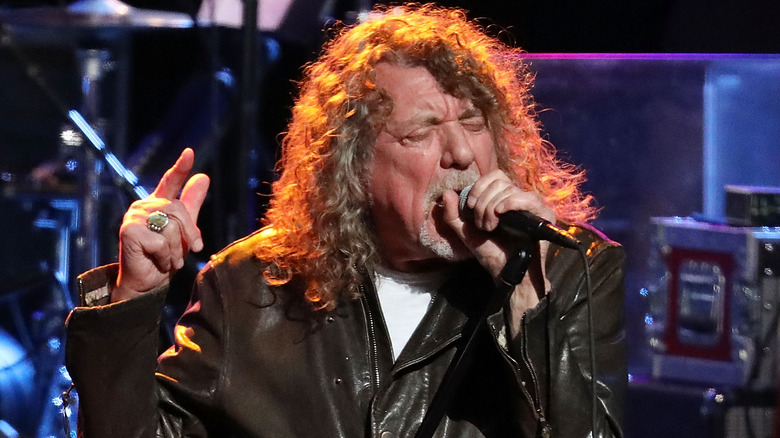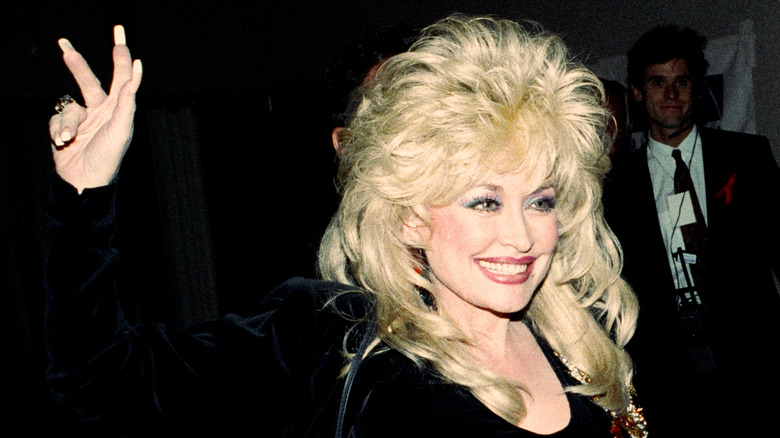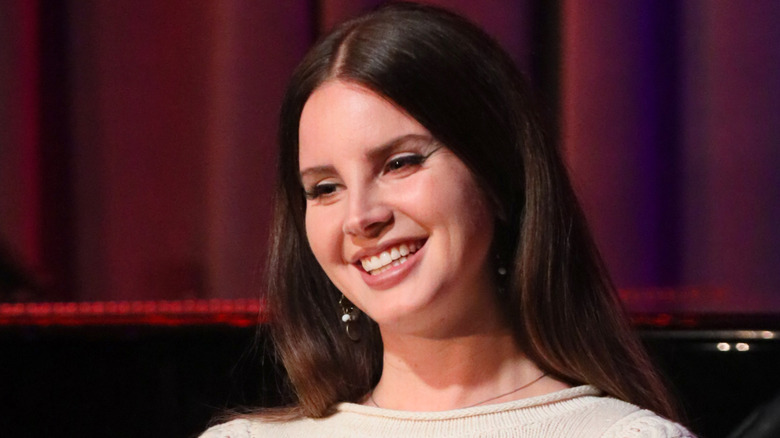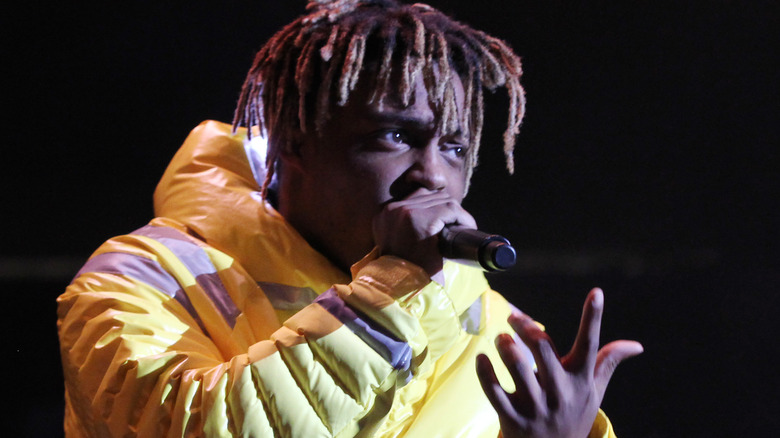Music You'll Only Be Able To Hear After The Singer Dies
Throughout the years, there have been plenty of musicians who have released albums after their deaths. Posthumous albums consist of songs and recordings that haven't previously been released to the public. This typically happens when an artist dies after recording music and before having the album released. Compilations and "best of" albums do not count, as they contain songs that have already been heard (via Cake).
There are also some instances when an artist plans to release a posthumous album, such as the case with the band Queen. Frontman Freddie Mercury was aware that his life was soon coming to an end because of his illness, so he recorded with his band as much as he could before his death. Guitarist Brian May recalled the creation of the album "Made in Heaven," which consisted of 13 songs, some of which were Mercury's final recordings, as reported by U Discover Music. "Our plan was to just make as much use of him as we could. You know he told us, 'Get me to sing anything, write me anything and I will sing it and I will leave you as much as I possibly can'," May recalled Mercury saying.
It seems that another artist is planning to release never-before-heard music upon his death. Robert Plant of Led Zeppelin discovered unreleased tracks from his archives, but the public won't be able to hear them just yet.
Robert Plant's recordings with other artists
Led Zeppelin was one of the biggest bands in the '70s, but they split up in 1980 when their drummer, John Bonham, died. After the tragedy, the band released a statement that read, "We wish to be known that the loss of our dear friend and the deep respect we have for his family, together with the sense of undivided harmony felt by ourselves and our manager, have led us to decide that we could not continue as we were" (via Express).
In an interview with Ultimate Classic Rock, Robert Plant revealed that he wrote and recorded music with just about anybody after Led Zeppelin's split. His archives consist of recordings with artists, such as The Buggles, Bruce Woolley, and Grace Jones. He also came across a number of unfinished projects and plenty of unreleased content. "I told the kids that when I kick the bucket, open it to the public — free of charge — just to see how many silly things there were down the line from 1966 to now: the journey," he said.
The Dolly Parton song that won't be released until 2045
Some artists really have fun with the concept of posthumous releases. For instance, Dolly Parton said she has a song hidden in Dollywood that won't be released until 2045, according to Insider. Now, Parton is 75 years old, so if she lives to 99, she might actually get to see this song released. "It would be a song that will never be heard until 30 years from the time we opened the resort. They said, 'You'll be long dead,'" Parton wrote in her book "Songteller: My Life in Lyrics," according to Insider. "I said, 'Well, maybe not. I'll be 99. I've seen people live to be older than that. So I wrote this song, and I can't say what it is." The song was written in 2015 to celebrate the opening of Dollywood DreamMore Resort.
Parton has promised fans other music after her death as well. She even told WNYC's podcast Dolly Parton's America that she has recorded vocal tracks that could be laid down in any type of song in the (hopefully) far-off future (via Rolling Stone). "Any producer anywhere in the world, when I'm gone, they could take my songs just the click track and my vocal and build a complete arrangement around that, any style. That will go on forever," Parton said.
"I'm one of those people that believe in being prepared," she added. "I don't want to ever leave my stuff in the same shape like Prince or Aretha or anybody that don't plan ahead."
Tattooed instructions by Anderson .Paak
In truth, posthumous releases aren't uncommon. They're almost guaranteed to happen if there's money to be made, and the deceased artists themselves hadn't forbidden it. "I think a lot of times, labels and estates, you know, face a little bit of a dilemma," said the critic Stephen Thompson in an interview with NPR. "You know, you don't necessarily want to be accused of just putting something out for the money. And at the same time, you don't want to bury an artist's legacy. If you have these recordings in your vault, it makes sense that you would want to share them just for archival purposes if nothing else."
This is why some artists are explicitly expressing their wishes now. In the wake of posthumous releases by Pop Smoke, Mac Miller, and Lip Peep, rapper and Silk Sonic member Anderson .Paak had the following instructions tattooed on his forearm (via The Face): "When I'm gone, please don't release any posthumous albums or songs with my name attached. Those were just demos and never intended to be heard by the public." The rapper, as Variety notes, got the tattoo in a time when posthumous albums had ranked in the top 10 charts nearly every week for the past two years.
What makes Mitski and Lana del Rey look twice
After Anderson .Paak posted a photo of his tattoo, the singer Lana Del Rey shared the photo to her Instagram account and said she had put the same instructions in her will, according to NME. And indie rocker Mitski shared similar feelings about posthumous releases in a 2017 interview with Vice.
"Honestly, the thought of me dying before I'm done with a record, and having it handled without me, is what makes me look twice before I cross the street," she said in the interview. "If I deliberately didn't release something while alive, it means I didn't want it released at all, and I am mortified at the thought of people going through my notebooks and voice memos and releasing them to the public without my say. I'm terrified of what people in herds or groups feel justified in doing to individuals in order to sate whatever deep curiosity they have about them."
Artists who say they're okay with posthumous releases
Yet other musicians, whether they're specifically planning on releasing music after their deaths, say they're fine with the idea. "I've actually thought about this recently," Lyndsey Gunnulfsen, of the band Pvris, told Vice. "If I died in a car accident while we were working on a new record, I would definitely want it out there, otherwise it's just a waste of time, and it never gets heard." When the pop artist Shura was working on her debut album "Nothing's Real," she told her brother to make sure it got out even if she died before it could be finished.
Whether the artists themselves are okay with posthumous releases, they're an increasingly huge part of the music industry. Juice WRLD's album "Legends Never Die" became the highest charting posthumous album ever in 2020, just months after his 2019 death (via The Hollywood Reporter). And Pop Smoke won five Billboard Music Awards in 2021 for music released after his 2020 death, including Top New Artist (via Vice).
Pharrell Williams' futuristic single
In November 2017, Pharrell Williams, super-producer, N.E.R.D. founder, singer, and rapper, shared a new single that may endure even longer than "Happy," the all-time ear-worm from the "Despicable Me 2" soundtrack that earned him an Oscar nomination.
Released to an ultra-small audience by design, exactly 100 people heard the song titled "100 Years." According to W Magazine, Williams and cognac brand Louis XIII held a listening party for the tune in Shanghai, China, that doubled as a party to raise awareness of climate change. The song itself is about humanity's destruction of the natural environment, and what the planet may look like after catastrophically rising sea levels in 100 years.
While the recording of the song is in safe-keeping for now, locked away in clay container in storage, if this predicted environmental Armageddon occurs, the music will be destroyed if the storage floods. Or, on the brighter side, when 2117 rolls around, the rest of the world may finally listen to "!00 Years."






